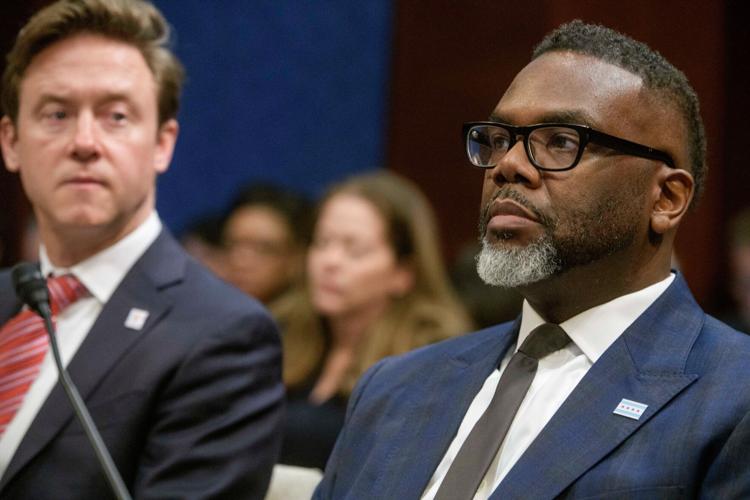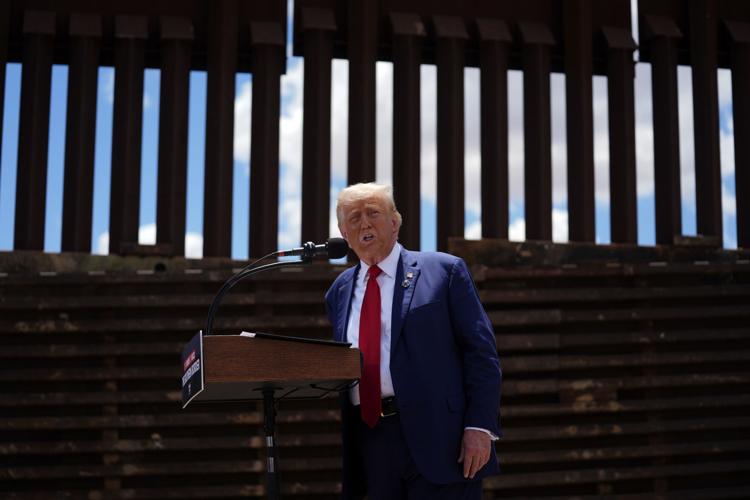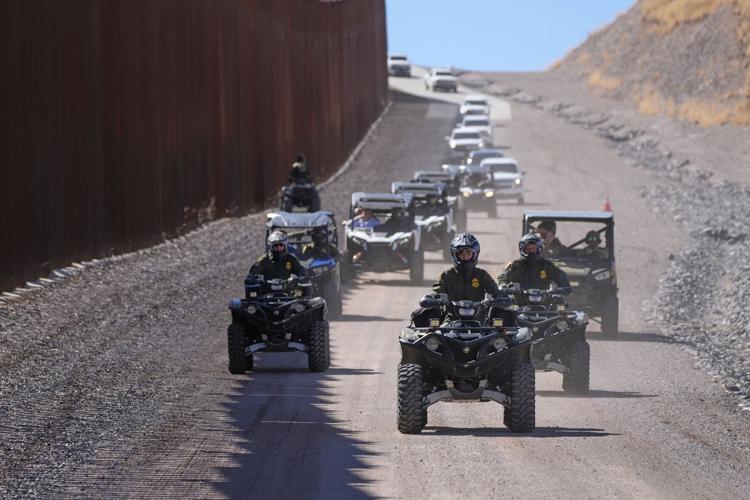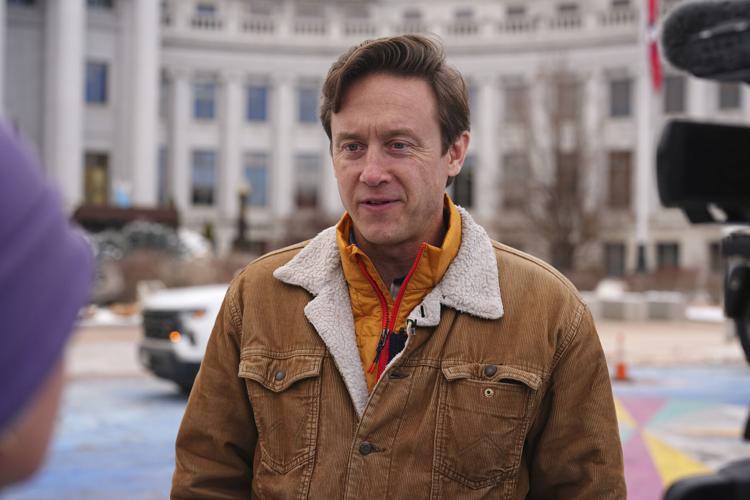Denver joins lawsuit against Trump administration over FEMA funds termination

Denver Mayor Mike Johnston, left, and Chicago Mayor Brandon Johnson, right, take their seats at the witness table during a House Committee on Oversight and Government Reform hearing with "sanctuary city" mayors on Capitol Hill, Wednesday, March 5, 2025, in Washington. (AP Photo/Rod Lamkey, Jr.)
Rod Lamkey
Denver has joined Chicago and Pima County in Arizona in filing a lawsuit against the Trump administration over its termination of federal funding awarded to local jurisdictions to help defray the cost of aiding the tens of thousands of immigrants who arrived in America’s interior cities after illegally crossing the U.S.-Mexico border.
Denver is seeking to secure $25 million that the city was awarded in reimbursements.
Denver, Chicago, and Pima County, which borders Mexico, asserted that the federal government’s actions are unconstitutional, arguing they are an attempt to override Congress’ constitutional authority to appropriate funds, according to a news release.
Additionally, the jurisdictions said the federal government violated the Administrative Procedure Act by failing to provide a reasoned basis for their actions.
“While Donald Trump has time and again tried to divide the country instead of finding bipartisan solutions on immigration, the people of Denver stood up and stood together to help people in need,” Denver Mayor Mike Johnston said in the release. “The Shelter and Services Program was intended for the sole purpose of reimbursing cities who did exactly that while following all federal, state, and local laws.”
Johnston added: “Now, the Trump administration is illegally trying to punish cities who did the work the federal government couldn’t. I am incredibly proud of how our city responded to this crisis and will continue to fight for the funding we were awarded but have not received.”
Johnston and Denver’s policies have been at odds with Trump and his administration’s immigration priorities since the president assumed office in January.
In terminating the funding, the White House said spending for illegal immigration is at odds with the administration’s priorities, as the U.S. Department of Homeland Security (DHS) is “focused on advancing the essential mission of enforcing immigration laws and securing the border.”
In March, Congress called Johnston and cadre of Democratic mayors of so-called “sanctuary” jurisdictions to testify in a hearing about their cities’ response to the influx of immigrants. Johnston also made headlines for saying he would be willing to go to jail defending the city’s immigration policies, a statement that brought praise and criticism.
Since the first Trump administration, Congress has appropriated funds to reimburse communities and states for costs incurred in helping immigrants who were processed and released by Homeland Security into the U.S.
In 2022, Congress continued this program through the Shelter and Services Program (SSP), administered through the Federal Emergency Management Agency (FEMA), and intended for the purpose of reimbursing cities for expenses they incurred as a result of the federal government’s immigration policies.
In the same year, Texas Gov. Greg Abbott began a bussing program that targeted “sanctuary cities” in six Democratic strongholds, including Denver, sending about 120,000 immigrants out of the Lone Star State to various states. Abbott bused nearly 20,000 immigrants — often dropping them off without notice — to Denver alone.
Generally speaking, a sanctuary city is a jurisdiction that establishes policies to discourage or prohibit local law enforcement from cooperating with immigration officers. Both the state of Colorado and the city of Denver have adopted such policies.
As an interior city more than 600 miles north of Mexico, Denver had not felt the impact of the illegal immigration crisis at the border until it spilled over into The Mile High City more than two years ago, when 90 immigrants were left to wander downtown in the cold. Traditionally, immigrants in previous waves have favored gateway cities, such as Chicago, Los Angeles and New York.
In the months since, more than 43,000 immigrants arrived in Denver. While city officials have not tracked how many have stayed, bus, plane and train tickets suggested about half have. That roughly equates to adding a city the size of Golden to the Denver metro area in less than 18 months.
Many of these new arrivals have come from south and Central America, particularly Venezuela.
Early in the crisis, officials decided the city would assume the costs of aiding the immigrants, a move that threatened the city’s finances and prompted Johnston to implement department cuts and cost-saving measures.
To date, the city’s response has cost about $90 million, according to Jon Ewing, Johnston’s spokesperson.
Of the $37 million awarded Denver in various federal grants, the city has received about $12 million, Ewing said. That means it’s still short about $25 million.
Denver taxpayers have assumed the bulk of the costs to house, feed and transport immigrants to other cities. Denver also created a program to help immigrants — many of whom fled the political instability and economic collapse in Venezuela — obtain work authorization.
Many came with not much more than the clothes on their backs, little-to-no money in their pockets and no familial support.
In their lawsuit, Denver, Chicago and Pima County cited these conditions. The immigrants were penniless, and, without work authorization, they were at risk of immediately becoming homeless. The plaintiffs said they responded to the crisis and expended “substantial resources,” as a result.
A key argument by the plaintiffs is that the Trump administration merely disagrees with Congress’ purpose in enacting the shelter program — but that rationale is insufficient to withhold funding from them. Additionally, the plaintiffs said the administration already decided to terminate the funds, even though its recent communications suggested that the reimbursements might still come at some future date, and that FEMA zeroed out balances “without informing grantees.”
They said FEMA has for months sat on drawdown requests from Chicago and Pima County.
“FEMA has decided that the Shelter and Services Program is gone, and grantees are simply left with the paperwork,” they argued in the lawsuit.
The funding decision by the Trump administration is but the latest in a series of actions to crack down, broadly speaking, on illegal immigration, and, in particular, on “sanctuary” cities.
“The individuals receiving these services often have no legal status and are in the United States unlawfully, such as those awaiting removal proceedings. This, in turn, provides support for illegal aliens and is not consistent with DHS’s current priorities,” Homeland Security said last month.
Officials in El Paso, Texas have said that the offer of temporary housing and free travel in Denver may have inadvertently created a “pull factor” to Colorado’s most populous city.
While border states have traditionally borne the brunt of the immigrant surges — by the nature of their proximity to Mexico — most do not stay and instead head for the perceived safety of interior cities, like Denver, that are outside the 100-mile border enforcement zone. This movement from border cities to the interior illustrates two pressing, but very different, needs for communities responding to the crisis: border communities have been left scrambling to decompress the immigrant surge, while interior cities are working to resettle them.
FEMA’s Shelter and Services Program was designed to help offset the costs associated with serving the immigrants. The bulk of the funding has been awarded to border states.
FEMA awarded grants to reimburse those costs incurred for providing services, as required by the congressional appropriation.







